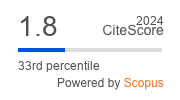Identification of Vehicle Types Using Learning Vector Quantization Algorithm with Morphological Features
Abstract
The increase in the number of vehicles every year results in traffic jams. So it is necessary to identify the type of vehicle so that the vehicle can be arranged according to the path. This study aims to develop a system that can identify the type of vehicle using the Learning Vector Quantization (LVQ) algorithm. For LVQ to work well in identifying, information in the form of characteristics of the object is needed. For this reason, the LVQ algorithm is combined with morphological feature extraction using the parameters of area, circumference, eccentricity, primary axis length, and minor axis length to obtain shape features. Based on the test results using a confusion matrix by calculating precision, recall, and accuracy, it is obtained that the precision value is 85%, recall is 82%, and accuracy is 83%. This paper shows that for vehicle identification, the combination of morphological feature extraction and LVQ algorithm produces a model that can identify vehicles based on their shape and classify classes through competitive layers that are supervised by single-layer network architecture. This makes the computational process faster and does not burden the computational process.
Downloads
References
BPS, “Perkembangan Jumlah Kendaraan Bermotor Menurut Jenis (Unit), 2018-2020,” Badan Pusat Statistik, 2022. [Online]. Available: https://www.bps.go.id/indicator/17/57/1/jumlah-kendaraan-bermotor.html.
C. Luo, Y. Hao, and Z. Tong, “Research on Digital Image Processing Technology and Its Application,” in International Conference on Management, Education and Information (MEICI), 2018, vol. 163, pp. 587–592.
R. I. Borman, F. Rossi, Y. Jusman, A. A. A. Rahni, S. D. Putra, and A. Herdiansah, “Identification of Herbal Leaf Types Based on Their Image Using First Order Feature Extraction and Multiclass SVM Algorithm,” in 1st International Conference on Electronic and Electrical Engineering and Intelligent System (ICE3IS) Identification, 2021, pp. 12–17.
M. Athoillah, “Klasifikasi Kendaraan Bermotor Dengan Multi Kernel Support Vector Mechine,” Buana Mat. J. Ilm. Mat. dan Pendidik. Mat., vol. 8, no. 1, pp. 1–8, 2018.
R. Himilda and R. A. Johan, “Klasifikasi Jenis Kendaraan Menggunakan Metode Extreme Learning Machine,” JTIM J. Teknol. Inf. dan Multimed., vol. 2, no. 4, pp. 237–243, 2021.
H. Mayatopani, R. I. Borman, W. T. Atmojo, and A. Arisantoso, “Classification of Vehicle Types Using Backpropagation Neural Networks With Metric and Ecentricity Parameters,” J. Ris. Inform., vol. 4, no. 1, pp. 65–70, 2021.
C. A. Wicaksana, D. E. Tyas, and L. Lufianawati, “Pengenalan Pola Vektor Tanda Tangan Citra Digital Menggunakan Metode Pembagian Wilayah dan Learning Vector Quantization (LVQ),” J. Ilm. Setrum, vol. 10, no. 2, pp. 24–29, 2021.
U. Sudibyo, D. P. Kusumaningrum, E. H. Rachmawanto, and C. A. Sari, “Optimasi Algoritma Learning Vector Quantization (LVQ) Dalam Pengklasifikasian Citra Daging Sapi dan Daging Babi Berbasis GLSCM dan HSV,” J. SIMETRIS, vol. 9, no. 1, pp. 1–10, 2018.
Y. Chen, L. Song, Y. Liu, L. Yang, and D. Li, “A Review of the Artificial Neural Network Models for Water Quality Prediction,” Appl. Sci., vol. 10, no. 5776, pp. 1–49, 2020.
W. Musu, A. Ibrahim, and H. Heriadi, “Pengaruh Komposisi Data Training dan Testing terhadap Akurasi Algoritma C4.5,” in Prosiding Seminar Ilmiah Sistem Informasi dan Teknologi Informasi, 2021, vol. X, no. 1, pp. 186–195.
K. Ayuningsih, Y. A. Sari, and P. P. Adikara, “Klasifikasi Citra Makanan Menggunakan HSV Color Moment dan Local Binary Pattern dengan Naïve Bayes Classifier,” J. Pengemb. Teknol. Inf. dan Ilmu Komput. Univ. Brawijaya, vol. 3, no. 4, pp. 3166–3173, 2019.
R. I. Borman, R. Napianto, N. Nugroho, D. Pasha, Y. Rahmanto, and Y. E. P. Yudoutomo, “Implementation of PCA and KNN Algorithms in the Classification of Indonesian Medicinal Plants,” in ICOMITEE 2021, 2021, pp. 46–50.
M. Wati, Haviluddin, N. Puspitasari, E. Budiman, and R. Rahim, “First-order Feature Extraction Methods for Image Texture and Melanoma Skin Cancer Detection,” J. Phys. Conf. Ser., vol. 1230, no. 1, 2019.
D. Riana et al., “Identifikasi Citra Pap Smear RepoMedUNM dengan Menggunakan K-Means Clustering dan GLCM,” J. RESTI (Rekayasa Sist. dan Teknol. Informasi), vol. 6, no. 1, pp. 1–8, 2022.
R. I. Borman, B. Priopradono, and A. R. Syah, “Klasifikasi Objek Kode Tangan pada Pengenalan Isyarat Alphabet Bahasa Isyarat Indonesia (Bisindo),” in Seminar Nasional Informatika dan Aplikasinya (SNIA), 2017, no. September, pp. 1–4.
M. F. Arifin and D. Fitrianah, “Penerapan Algoritma Klasifikasi C4.5 Dalam Rekomendasi Penerimaan Mitra Penjualan Studi Kasus: PT Atria Artha Persada,” InComTech, vol. 8, no. 2, pp. 87–102, 2018.
D. Nurnaningsih, D. Alamsyah, A. Herdiansah, and A. A. J. Sinlae, “Identifikasi Citra Tanaman Obat Jenis Rimpang dengan Euclidean Distance Berdasarkan Ciri Bentuk dan Tekstur,” Build. Informatics, Technol. Sci., vol. 3, no. 3, pp. 171–178, 2021.
Copyright (c) 2022 Jurnal RESTI (Rekayasa Sistem dan Teknologi Informasi)

This work is licensed under a Creative Commons Attribution 4.0 International License.
Copyright in each article belongs to the author
- The author acknowledges that the RESTI Journal (System Engineering and Information Technology) is the first publisher to publish with a license Creative Commons Attribution 4.0 International License.
- Authors can enter writing separately, arrange the non-exclusive distribution of manuscripts that have been published in this journal into other versions (eg sent to the author's institutional repository, publication in a book, etc.), by acknowledging that the manuscript has been published for the first time in the RESTI (Rekayasa Sistem dan Teknologi Informasi) journal ;








